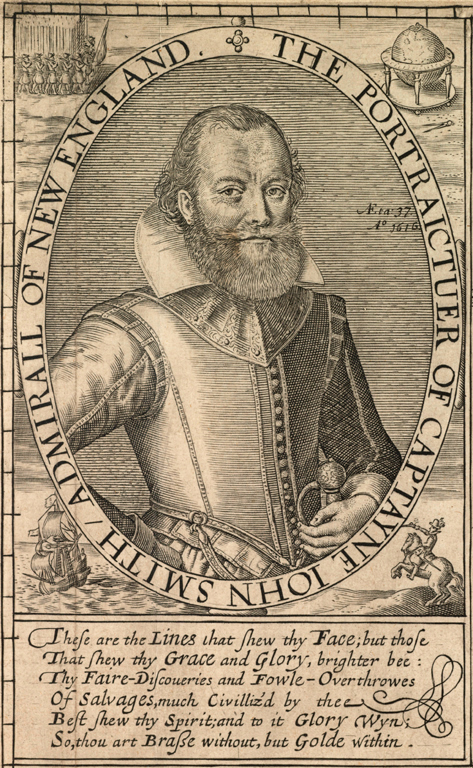John Smith (baptized 1580 –1631), an English soldier, author, and adventurer, played a crucial role in establishing the Virginia colony at Jamestown, England’s first permanent settlement in North America, in 1607. As one of the colony’s leaders, he explored the area and forged relationships with Indigenous tribes. His leadership was controversial, but Smith undoubtedly helped the colony survive its difficult early years. Smith’s legacy is also problematic given his self-aggrandizing tendencies, criticism from his detractors, and his sometimes exploitative dealings with Indigenous peoples. Nevertheless, his writings on the Virginia colony and Indigenous life, as well as his geographically accurate map of the Tidewater region, have proven invaluable to our knowledge of Virginia history of the early 1600s.
Read John Smith's description of the Powhatans in his 1612 publication, A Map of Virginia:
Each household knoweth their owne lands and gardens, and most live of their owne labours.
For their apparell, they are some time covered with the skinnes of wilde beasts, which in winter are dressed with the haire, but in sommer without. The better sort use large mantels of deare skins not much differing in fashion from the Irish mantels...
Their buildings and habitations are for the most part by the rivers or not farre or distant from some fresh spring. Their houses are built like our Arbors of small young springs bowed and tyed, and so close covered with mats or the barkes of trees very handsomely, that not withstanding either winde raine or weather, they are as warme as stooves, but very smoaky; yet at the toppe of the house there is a hole made for the smoake to goe into right over the fire...
Their houses are in the midst of their fields or gardens; which are smal plots of ground, some 20, some 40, some 100. some. 200. some more, some lesse. Some times 2 to 100 of these houses togither, or but a little separated by groves of trees. Neare their habitations is little small wood, or old trees on the ground, by reason of their burning of them for fire...
Men women and children have their severall names according to the severall humour(s) of their parents. Their women are easilie delivered of childe, yet doe they love children verie dearly. To make them hardy, in the coldest morning they wash them in the rivers, and by painting and ointments so tanne their skins that after year or two, no weather will hurt them.
The men bestow their times in fishing, hunting, wars, and such manlike exercises, scorning to be seene in any woman like exercise; which is the cause that the woman be verie painfull and the men often idle. The women and children do the rest of the worke. They make mats, baskets, pots, morters; pound their corne, make their bread, prepare their victuals, plant their corne, gather their corne, beare al kind of burdens, and such like...
Their fishing is much in Boats. These they make of one tree by bowing and scratching away the coles with stone and shels till they have made it in form of a Trough. Some of them are an elne deepe, and 40 or 50 foot in length, and some will beare 40 men; but the most ordinary are smaller, and will beare 10, 20, or 30 according to their bignes. Insteed of oares, they use paddles and sticks, with which they will row faster then our Barges...
There is yet in Virginia no place discovered to bee so Savage in which the Savages have not a religion, Deare, and Bow and Arrowes. All thinges that were able to do them hurt beyond their prevention, they adore with their kinde of divine worship; as the fire, water, lightening, thunder, our ordinance peeeces, horses, etc.
Although the countrie people be very barbarous; yet have they amongst them such government, as that their government, as that their Magistrats for good commanding and their people for du subjection and obeying, excell many places that would be counted very civill.
The forme of their Common wealth is a monarchicall governement. One as Emperour ruleth over many kings or governours. Their chiefe ruler is called Powhatan, and taketh his name of the principal place of dwelling called Powhatan. But his proper name is Wahunsonacock.

